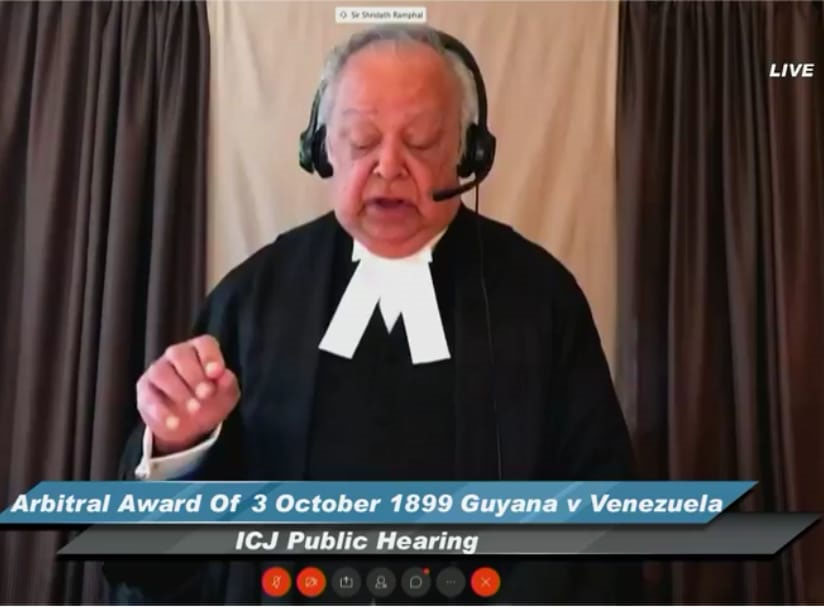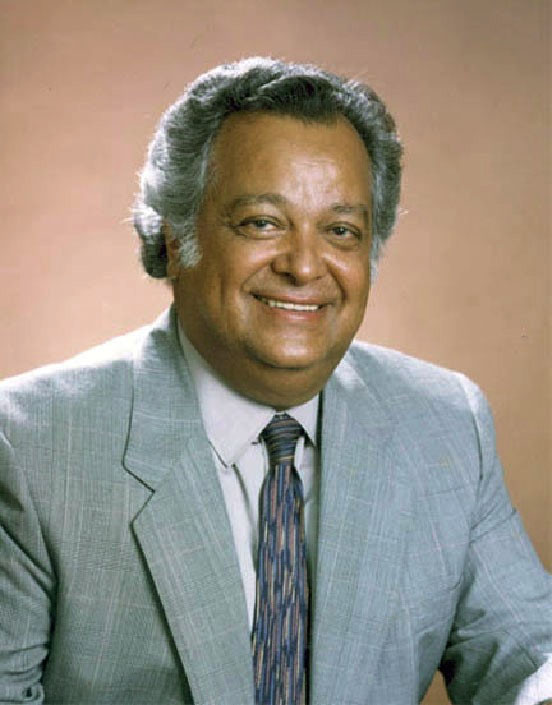-hailed by President Ali as `giant among men’
International statesman and former long-serving Commonwealth Secretary General Sir Shridath Ramphal passed away yesterday at the age of 95 and was lauded for decades of high-level service to Guyana, the region and further afield.
His passing was announced by his son-in-law Sir Ronald Sanders.
“The family of Sir Shridath `Sonny’ Ramphal is deeply saddened to announce his peaceful passing on 30th August, 2024 surrounded by his children. Sir Shridath, born on October 3, 1928, in New Amsterdam, British Guiana (now Guyana), was a towering figure in international diplomacy and a cherished elder statesman of the Commonwealth and the Caribbean”.
President Irfaan Ali hailed him as a “giant among men”.

He said: “The passing of Sir Shridath Ramphal marks the end of an era, not only for Guyana but for the entire Caribbean and the Commonwealth of Nations. We mourn the loss of an outstanding statesman, a regionalist par excellence, and a committed internationalist. Sir Shridath’s life was one of magnificent service—dedicated to his homeland, to the region, and to the world.
“Guyana recalls with deep appreciation, his unflagging commitment to defending Guyana’s territorial integrity and sovereignty. His efforts before the International Court of Justice and the Tribunal of the United Nations Convention on the Law of the Sea (UNCLOS) were not just a service to the nation; they were acts of supreme and selfless devotion to the land that nurtured him. He was deservedly the recipient of Guyana’s highest national award, the Order of Excellence.
“As Secretary-General of the Commonwealth, he stood tall against the injustices of apartheid, becoming a voice for the oppressed and a champion for justice and equality. His firm opposition to apartheid rule will be remembered as one of the defining aspects of his illustrious international career. His contributions went beyond the Common-wealth, shaping the international relations with his wisdom and leadership”.
He said that “Guyana has lost one of its finest sons, and the Caribbean and the Commonwealth, a giant among men”.
Opposition Leader and Leader of the PNCR Aubrey Norton also offer-ed encomiums.
“I join the local and global community in extending sincere condolences to the family of Sir Shridath Ramphal on his death on the 30th August 2024. Sir Shridath belongs to a long list of distinguished Guyanese. His achievements were in the field of international politics and diplomacy. Here his achievements brought him personal renown and made his country a symbol of excellence and a distinguished member of the international community. In his (95) years on God’s earth, Sir Shridath rose from the position of a lawyer to become at various times Assistant Attorney General of the West Indies Federation; Minister of Justice and Foreign Affairs of Guy-ana; Secretary General of the Commonwealth Secre-tariat; and an active participant in Global Affairs serving on all global Commissions dealing with development, the environment and disarmament; and being fully and actively involved in helping both Zimbabwe and South Africa to attain their freedom”, Norton said.
Norton said that his party and the people of the Caribbean will remember the pivotal role he played in the establishment of the Caribbean Community.
“His role as the Chief Negotiator in the Regional Negotiation Machinery (RNM) and his Chairman-ship of the West Indian Commission are events which this region will not forget. Sir Shridath was indeed a colossus who bestrode the world of Global politics and etched his name in the annals of diplomacy of the twentieth and twenty first century. Yet the enduring image remains of Sir Shridath, impeccably clad, at the age of ninety two, delivering his speech in defence of the territorial integrity and sovereignty (of Guyana” at the International Court of Justice (ICJ)”, Norton stated.
The PNCR Leader contended that Sir Shridath’s career will not be easily understood if his achievement of bringing the Ministry of Foreign Affairs into existence when such an institution never existed before is not taken into account.
“Guyana’s external relations were conducted by the British Government as we were a colony. As independence approached, the Colonial administration quickly established the Department of External Affairs. At independence, this became the Ministry of External Affairs. The Prime Minister, Mr. Linden Forbes Sampson Burnham, assumed the position of Minister of Foreign Affairs. He appointed Sir Shridath as Minister of State. It so happened that at this time Guyana was about to host the first Foreign Ministers Meeting of the Non Aligned meeting in the Western Hemisphere. In order to ensure that Sir Shridath could appropriately chair the Foreign Ministers meeting, Burnham appointed him as a full Minister of Foreign Affairs. Sir Shridath’s chairmanship of this conference was brilliant and prudent. The success of this conference has never been questioned”, Norton enthused.
As a Foreign Minister, Norton said that Sir Shridath had to ensure that his Ministry was staffed and trained in the art of diplomacy.
“In this endeavour, he was assisted by both Prime Minister Burnham and Rashleigh Jackson, the first Permanent Secretary. And while Sir Shridath was fully employed building up the Ministry of Foreign Affairs as an institution, both Venezuela and Surname were renewing their claims to our territory. Some analysts have argued that the pressure on our territorial integrity and sovereignty was the crucible in which our diplomats acquire particular skills in such critical areas as multilateral diplomacy, the art of negotiations, and the promotion of the nation’s Foreign Policy. It would be necessary to state here that through a series of speeches and pronouncements by Sir Shridath and Prime Minister Burnham, Guyana arrived at a suitable and appropriate Foreign Ministry. That Foreign Policy was successful enough to ensure the election of Guyana to, among other things, the World Court, serve twice on the Security Council, and allowed our diplomats to make significant contributions to international diplomacy”.
Norton noted that Sir Shridath served for some time as the Minister of Foreign Affairs and then decided to run for the position of Secretary General of the Commonwealth Secretariat.
“He was successful primarily because he had distinguished himself in the capacity of Foreign Minister and made himself a brilliant figure of international politics. It is often forgotten that after being the longest serving Secretary General of the Commonwealth, Sir Shridath had decided to seek election as the Secretary General of the United Nations. The outcome of Sir Shridath’s decision to become UNSG is best told in his own words. In canvassing the big powers Sir Shridath had to approach the Soviet delegate to the UN, Mr. Oleg Troyanovsky. This is what the Soviet Ambassador told him:
“`Your candidature presents us with a problem; you remind us too much of Hammarskjold, and as you know he was a major problem for Russia. We even at one stage suggested a ‘troika’ in place of a single Secretary General’”. Sir Shridath concluded that the Russians were saying they would veto his candidature, but he realized that he could not count on the support of one of the members of the Security Council. He was also not sure that the French and Americans would not veto his candidature”, Norton noted.
CARICOM Secretary General Carl Barnett expressed sadness at his passing.
“In an illustrious career devoted to public service, Sir Shridath blazed a trail of excellence in diplomacy, law, academia and politics, earning respect and admiration in his homeland Guyana, elsewhere in the Caribbean Region, and across the Commonwealth of Nations.
“He was a leading advocate of regionalism, and contributed practically to its advancement, notably in high-level service to the legal fraternity, institutions of higher learning, and as Chairman of the West Indian Commission which produced the 1992 seminal report, “Time for Action”. An astute negotiator, he was appointed by Heads of Government to lead the CARICOM Regional Negotiating Machinery in negotiations in the external trade arena.
“Included among his well-deserved accolades is the Region’s highest honour, the Order of the Caribbean Community, which he received in 1992 in the first conferral of the award, for his sterling contributions to the Region”, she said.
Spanned
The statement from his family said that Sir Shridath’ s career spanned numerous pivotal roles: Assistant Attorney-General of the West Indies Federation, Minister of Justice and Foreign Affairs of Guyana, and Secretary-General of the Commonwealth. He also held concurrent positions as Chancellor of the University of Guyana, the University of the West Indies, and Warwick University.
“He was the only individual to have served on all the Global Commissions that produced landmark reports on the environment, development, and disarmament between 1980 and 1995. As Chairman of the West Indian Commission, his 1992 report, “Time for Action,” remains a seminal blueprint for Caribbean development.
“Globally respected, Sir Shridath served in various capacities, including President of the World Conservation Union, Special Adviser to the UN Conference on Environment and Development, and Chief Negotiator for the Caribbean on External Economic Relations. He was also a mediator and facilitator in elections and constitutional crises.
“As the longest-serving Commonwealth Secretary-General from 1975 to 1990, Sir Shridath was instrumental in the fight against institutional racism in Southern Africa, playing a key role in the termination of apartheid in South Africa. Nelson Mandela once said of him: `He is one of those men who have become famous because, in their fight for human justice, they have chosen the whole world as their theatre’”, the statement said.
In his later years, his family noted that Sir Shridath continued to serve with distinction. At 92, amidst the COVID-19 pandemic, he was the first lawyer to appear virtually before the International Court of Justice, representing Guyana in its border controversy with Venezuela.
Early life and academic excellence
Born on October 3, 1928, in New Amsterdam, Berbice, British Guiana, Sir Shridath’s early education at Queen’s College in Georgetown laid the foundation for his future endeavors. Pursuing higher studies in the UK, he was admitted to Gray’s Inn in London in 1951 and earned an LLM from King’s College London in 1952, where his academic prowess earned him the Arden and Atkin Prize. His scholarly pursuits continued with a Guggenheim Fellowship at Harvard University in 1962, reinforcing his commitment to global affairs.
Professional and Academic Contributions
His roles included:
– Secretary-General of the Commonwealth (1975-1990), where he advocated for global cooperation and development.
– Chancellor of Major Universities , including the University of Guyana (1988-1992), the University of the West Indies (1989-2003), and the University of Warwick (1989-2001).
– Chief Negotiator for the Caribbean on External Economic Relations (1997-2001) and key roles in international arbitration and mediation, such as the Guyana-Suriname Maritime Arbitration (2004-2007) and the Belize-Guatemala Border Dispute mediation (2000-2002).
Government Service and International Commissions
In Guyana, Ramphal held pivotal government positions:
– Attorney-General (1965-1973)
– Minister of Foreign Affairs and Justice (1973-1975)
– Minister of State for External Affairs (1967-1972)
He also served on influential international commissions, including the Independent Commission on International Development Issues (1980) and the World Commission on Environment and Development (1987).
In his memoir, Glimpses of a Global Life and Triumph for UNCLOS, Sir Shridath provides an in-depth look at his lifelong dedication to international law and regional integration. These works not only highlight his pivotal role in shaping global diplomacy but also showcase his steadfast commitment to principles of justice and equality. Ramphal’s advocacy for human rights extended to supporting LGBTQ+ rights, illustrating his broader commitment to social justice and fairness
As Sir Shridath celebrated his 80th birthday, the global community came together to honour his contributions to diplomacy and regional integration. His work with institutions such as the West Indies Federation, Carifta, CARICOM, and the Commonwealth, alongside his pivotal role in establishing the ACP Group of Countries left an indelible mark on both Caribbean and global stages.
A significant development in preserving Sir Shridath’s legacy was the digital release of his papers, spanning 72 years of public service, which are now available online at www.sirshridathramphal.com. This comprehensive digital archive provides free access to his extensive body of work, including his roles as Assistant Attorney-General, Secretary-General of the Commonwealth, and Chairman of the West Indian Commission.
Involvement in Guyana’s political landscape
During Guyana’s tumultuous 2020 general elections, Sir Shridath played a role in advocating for democratic integrity and national unity. His support for CARICOM and his staunch emphasis on upholding democratic principles were instrumental during this period of political crisis.
During Guyana’s elections turmoil in 1997 he was one of the `three wise men’ who helped to create a framework for stability via the Herdmanston Accord and subsequently the St Lucia Statement.
In his later years, Sir Shridath was actively engaged in supporting diplomatic initiatives to resolve the border controversy between Guyana and Venezuela. He passed away with the case at a crucial stage.
While it was in the opposition, the PPP had had strained relations with Sir Shridath as it had accused him of turning a blind eye to rigged elections here. Relations with the party improved under former President Bharrat Jagdeo and there was continuous involvement in matters under PPP/C governments and a crucial moment in the APNU+AFC administration where he presided over the bridging deed between the 1999 Production Sharing Agreement with ExxonMobil and the controversially-clinched 2016 version. He had not spoken publicly on that matter.










